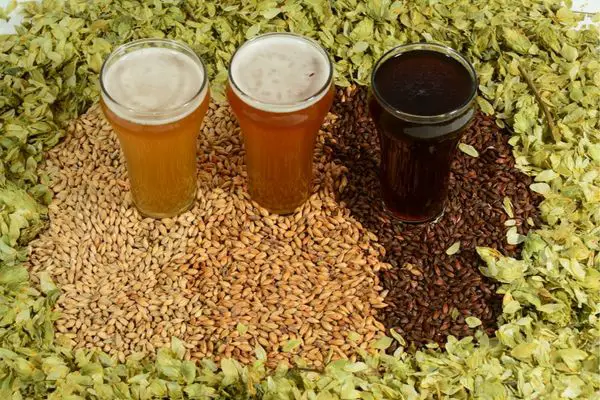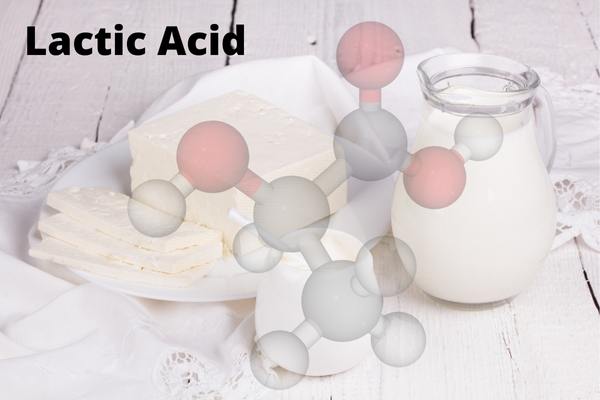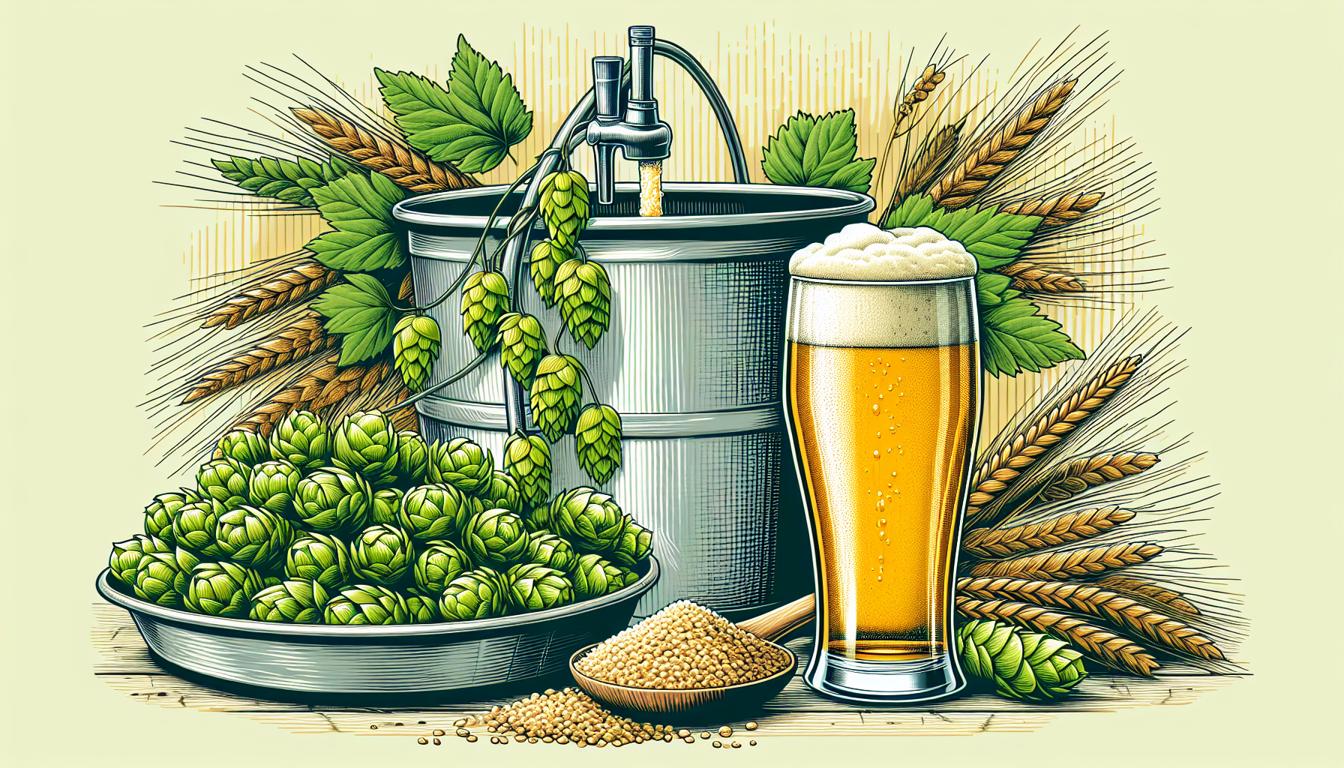For brewers around the world, the summer season means sour beers. The rise of craft breweries in the United States is partially responsible for keeping the brewing traditions behind these sour ales and lagers alive.
Sour beers are somewhat in between a cider and a regular beer when it comes to taste, but they are quite unique in the way they are produced!
If you’re trying to be gluten-free, however, you might be wondering: are sour beers gluten-free?
Unfortunately, like most beers, most sour beers have gluten in them. Centuries of brewing tradition include wheat in sour beer recipes. However, like the rest of the craft brewing culture, the options for gluten-free sour beer are expanding all the time.
How can you drink a sour beer without worrying about wheat? The rest of this article will go into types of sour beers and how to successfully look for a gluten-free one.
What Is A Sour Beer?
A sour beer is in most ways a normally-brewed beer with bacteria or microflora added somewhere in the process.
Common bacteria include lactobacillus acidophilus and Pediococcus. Historically, sour beers were, and some still are, left open to the air so bacteria could get in and give the brew its characteristic acidity. Some sour beers include fruit or fruit juices, but not all of them do.

Technically, before pasteurization, basically, all beer was at least a little sour. More modern brewing processes gave us the variety of non-acidic ales, stouts, and lagers we have today.
Unfortunately for gluten-intolerant and celiac beer drinkers, a lot of recipes for sours include wheat.
Since the process of making Gluten-Free Beers is relatively recent, there hasn’t been a need to change centuries of brewing history before now.
However, this doesn’t mean you don’t have options for a sour beer.
What Types of Sour Beers Have Gluten and Why?
Perhaps some of the most well known sour lactic acid fermented beers out there are the Gose and Lambic types of beers.
Gose (are gose beers gluten free?)
German in origin, a Gose is a type of sour with a salty punch. Traditionally, brewers used the salty water of the river Gose to make the brew. Craft brewers today follow this history and add some salt to their recipes. They also usually add some coriander.
Unfortunately, the traditional way to brew a gose usually includes some malted wheat, which leads to the, containing some amount of gluten. The mash is usually 50% wheat. This is why you’re unlikely to find a gluten-free gose.
However, there are a few readily available gluten-free alternatives of gose beers availible:
- Glutenberg Gose: This gluten-free brewery in Canada releases a seasonal gose made with buckwheat, millet, and quinoa.
- Ghostfish Brewing Gosefish Hibiscus Cranberry Gose: This is a seasonal collaboration between Ghostfish and Revelation brewing companies. Though they change the recipe a little bit every year, it’s always guaranteed to be gluten-free.
Lambic
This traditionally Belgian sour is also made with some amount of wheat. This is unlikely to really change anytime soon. European law has safeguards that preserve traditional brewing recipes.
Whereas Gose sour beers are not truly “spontaneously” fermented as the lactic acid bacteria and yeast are added to them, the lambic beers are traditionally fermented in a less controlled manner by “contamination” with wild yeasts and bacteria from the surroundings.
Furthermore, lambics are aged in barrels whereas a gose beer is not.

Still, you shouldn’t totally give up hope on a gluten-free lambic. Even European brewers are realizing the importance of a gluten-free beer option.
Confusingly, there is a subtype of lambics called “Gueuze”, which is a mix of new and older-aged lambics mixed together and allowed to ferment further on the bottle. Sometimes with a small amount of fruit juice added!
Berliner Weisse
Weisse is German for wheat, so you can pretty easily guess there aren’t many gluten-free options for this one.

This is another German sour beer, and its history potentially goes back 500 years! Luckily, if you love Berliner Weisses, the brewing process does lend itself to wheat alternatives like sorghum.
Do Sour Beers Have Less Gluten Than Regular Beers?
There is no evidence to suggest sour beers as a rule have less gluten than regular beers. It really depends on the type.
Whether a sour is lower gluten or gluten-free will largely depend on the ingredients and manufacturing process.
Since many sour beer recipes still include wheat, it’s safe to assume many will have about the same gluten content as other beers.
Do All Sour Beers Have Gluten?
Some varieties of sour beers use barley without any wheat added. These include Flanders or Flemish red and brown ales. However, due to cross-contamination, the barley in these beers might still have some gluten, but not enough to provoke a reaction in most people!
Because most modern breweries use enzymes to break down the gluten in their beers and additionally filter the final product, few sour beers will have much gluten left even if wheat is used in the brewing process!

A good rule of thumb is that if the beer is crystal clear, which is usually the case for lager types of sour beers such as pilsners, bocks, märzen, dunkel or schwarzbier , they are virtually free of gluten and you can safely drink them!
But it also depends on your specific condition and sensitivity. So since most beers, in general, have trace amounts of gluten content, it’s a good idea to email the brewery about their sour beer to ask if they use gluten proteinase enzymes and filtration to remove the gluten or not.
They should be able to tell you if there’s gluten in the ingredients or wheat anywhere in the manufacturing process.
Are Sour Beers Ales or Lagers?
Here’s the thing: you’ll see both sour ales and sour lagers available for sale. The
The real, technical difference between ales and lagers is how they’re fermented. Ales generally ferment at warmer temperatures, and lagers generally ferment at colder temperatures.
Brewers use top-fermenting yeast to make ales, and bottom-fermenting yeast to make lagers. Of course, there is some crossover between the two categories and these distinctions aren’t always clear.

There is some debate in the craft beer community over whether sours should be in their own category of beer, separate from both ales and lagers.
Lagers are usually cleared and therefore virtually gluten-free, but it might differ from brewery to brewery.
Are Sour Ales Gluten-Free?
Since we know the distinction between an ale and a lager is the fermentation, there’s nothing to suggest a sour ale will be gluten-free and a sour lager will have gluten, or vice versa.
Like most gluten-free products, whether or not a sour beer is gluten-free largely depends on the ingredients and the facility.
Most breweries will use some type of wheat flakes or similar in their ale style sour or farmhouse style wild fermented beers.
Depending on how gluten-sensitive you are, this might not be a problem but you might want to check whether the brewery making your sour is gluten-free.
Even if the beer doesn’t include wheat, gluten could still get in thanks to the presence of wheat in the facility. Looking for a sour made in a dedicated wheat-free facility will reduce the risk of cross-contamination.
Beers Considered Gluten-Free
There is a wide variety of beers available in the market today that cater to individuals with gluten sensitivities or celiac disease.
These beers have been specially crafted to contain less than 20 parts per million (ppm) of gluten, making them suitable options. Here are the main categories of beer that are considered safe for celiacs:
- Gluten-Removed Beers: Certain breweries utilize enzymes during the brewing process to break down gluten proteins. Beers labeled as “gluten-removed” or “crafted to remove gluten” usually fall below the 20 ppm threshold. However, it’s important to note that these beers may still contain trace amounts of gluten and might not be suitable for everyone with celiac disease.
- Gluten-Free Beers: Breweries also produce beers that are entirely free of gluten. These beers are brewed with ingredients such as sorghum, rice, corn, or millet, which naturally do not contain gluten. They are generally safe for individuals with celiac disease or gluten sensitivities.
- Highly Filtered Beers: According to a study by the Swedish National Food Agency, certain pilsners, including Carlsberg, Zeunerts, Falcon Export, or Urquell, contain less than 20 ppm gluten, despite being produced using ordinary barley malt without enzymatic treatment to reduce gluten. A clear appearance is often an indicator of low gluten content in pilsners made from ordinary barley malt.
It’s crucial to note that gluten levels can vary across different batches or brands, so it’s advisable to check the specific beer’s labeling or contact the brewery directly to ensure it aligns with your gluten tolerance level.
Pilsners generally have the lowest gluten content, likely due to the cold brewing process that results in protein precipitation and the rigorous filtration they typically undergo.
However, as stated on smartgurlsolutions.com, the following beers were consumed by the author, who suffers from celiac disease, with no adverse effects. These beers contain less than 5 ppm of gluten:
- Bass Ale (Bass Brewers Ltd) – Pale Ale (Bottle) – 5.1%
- 60 Minute IPA (DogfishHead) – IPA (Bottle) – 6.0%
- Bad Santa (Pelican Brewing) – Winter Ale (Bottle) – 7.5%
- Big Wave Golden Ale (Kona Brewing Co) – Golden Ale (Bottle) – 4.4%
- Black Butte Porter (Deschutes) – Porter (Bottle) – 5.2%
- Guinness Draught (Guinness) – Stout (Bottle) – 4.3%
- Fat Tire Ale (New Belgium) – Belgian Ale (Bottle) – 5.2%
- Fire Rock Pale Ale (Kona Brewing Co) – Pale Ale (Bottle) – 5.8%
- Kanaha Blonde Ale (Kona Brewing Co) – Blonde (Bottle) – 4.2%
- Mirror Pond Pale Ale (Deschutes) – Pale Ale (Bottle) – 5.0%
- Narwhal Imperial Stout (Sierra Nevada) – Imperial Stout (Bottle) – 10.2%
- Old Rasputin Imperial Russian Stout (North Coast Brewing Co.) – Imperial Stout (Bottle) – 9.0%
- Pub Beer Lager (10 Barrel) – Lager (Can (Pint)) – 5.0%
- Rainbows & Unicorns IPA (Breakside Brewing) – IPA (Bottle) – 5.1%
- Sidecar IPA (Sierra Nevada) – IPA (Bottle) – 6.8%
- Smithwick’s Red Ale (Smithwick’s & Sons) – Red (Bottle) – 4.5%
- Stone IPA (Stone Brewery) – IPA (Bottle) – 6.9%
- The Optimist IPA (Fort George) – IPA (Can (12 oz)) – 6.2%
- VooDoo Ranger Atomic Pumpkin Ale (New Belgium) – Pumpkin Ale (Can) – 6.4%
Individuals with severe gluten allergies or celiac disease should consult with a healthcare professional before consuming any beer or alcoholic beverages to ensure their safety.
Are sour beers high in sugar?
Another component that may be problematic for some people is the amount of sugar left in the sour beers.
Some of the sugars cannot be readily digested by us, but maybe digested by bacteria in our stomach, which may cause gas and bloating.
Whereas Lambic sour beers contain a normal amount of sugar for a beer, the gueuze beers undergo an extra secondary fermentation on the bottle, which eliminates almost all leftover sugars!
| Alcohol | Sugar per 100ml | |
| Lambic | 2-8% | 3-6g |
| gueuze | 5-9% | 0.2g-2g |
| Berliner Weisse | 3.2% | 3g |
However, the catch with gueuzes is that fruit juice is often added to the secondary bottle fermentation to counteract some of the tartness and sour taste, which again adds to the sugar content depending on the type and amount added.

However, I would still say that the gueuzes are pretty much the lowest sugar options you can get.
Is Sour Beer Good for Your Gut?
Sour beers are made using lactic acid bacteria, which, although they may not still be alive when you drink the beer, will have left some of their acidic metabolites in your sour beer.
These compounds (short-chained fatty acids) are the same as those that are found in yogurt, some wild fermented ciders, and sour kraut that are believed to be healthy for your gut.
However, not everyone responds the same to these quite acidic fermented products and even if you know you don’t have a gluten intolerance, if sour beers cause some stomach upset, you might be wondering why.
The lactic acid bacteria used to ferment sour beers do, as the name suggests, produce acids that may sometimes upset your stomach. So if you are sensitive to yogurts or vinegar, sour beers may be problematic as well.
Although lactobacillus acidophilus is naturally present in the human digestive system, it can still cause stomach and intestinal issues in some people.

Most sour beers are fermented using these bacteria, and it’s present in several other foods, including kimchi, sauerkraut, and yogurt. It’s also a popular probiotic. If you know that any of these things hurt your stomach, it’s best to avoid sour beers, too.
However, the most likely culprit here is going to be the alcohol present in the sour beer!
Alcohol itself speeds up the peristaltic movements of your intestinal muscles. This means anything with alcohol in it could cause an upset stomach or related symptoms like diarrhea.
Obviously, some people are more sensitive to this effect than others. If you consistently have these symptoms after even a couple of drinks the night before, consider cutting down on alcohol, or cutting it out completely.
There are also alcohol-free sour beers you can try!
Conclusion
Sour beers, like all other beers made with wheat malt, will contain some amount of gluten. Sour beers do not contain less gluten than normal beers, because the ingredients are very similar and only the fermentation differs.
So as most sour beers contain some wheat or gluten. If you’re gluten intolerant, I suggest looking specifically for a gluten-free sour.
There might not be as many options, but the list is growing all the time.
And if you are not extremely gluten intolerant, you can just go for the clear versions of sour beers that will have virtually no gluten in them.




